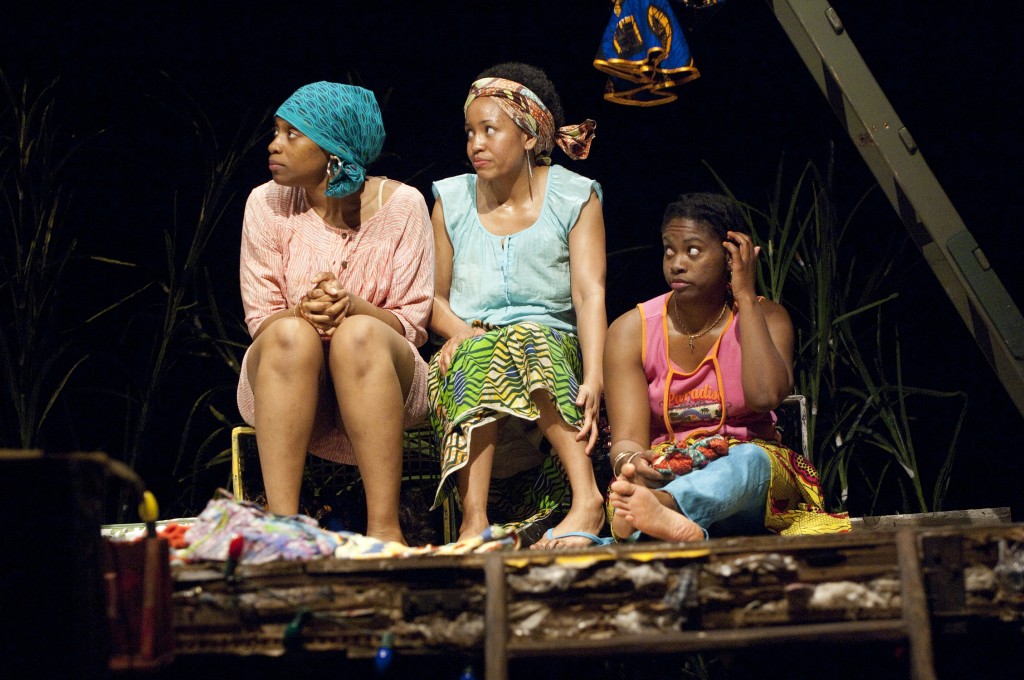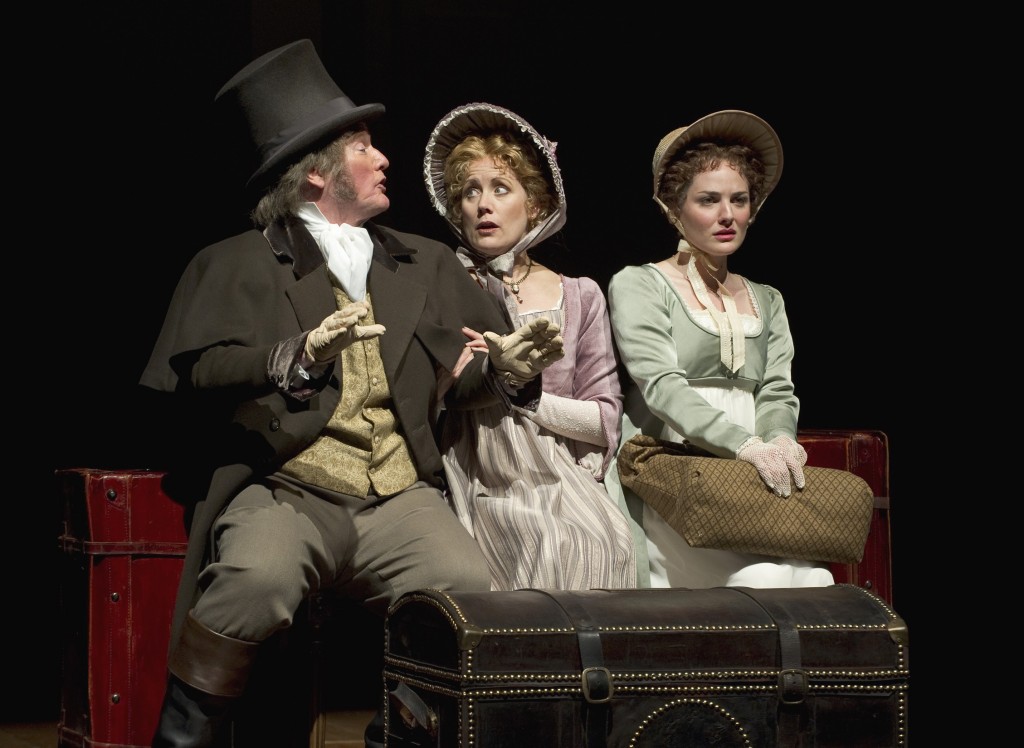
By Bob Hicks
Art Scatter, despite its name, is mostly about pulling things together. We examine the daunting scatter of incident that is contemporary culture — this endlessly broad turmoil of emotions, beliefs and events — and gather them together, looking for patterns, similarities, fragments of coalescence. Out of chaos, we seek structure and story. We do this for you, our readers, but also for ourselves, because story, we’ve come to believe, is how we make sense of the subterranean roil of chaos that is life.
Maybe that’s why the Oregon Shakespeare Festival has become an annual touchstone in our lives. Mr. Scatter first came to this company, many years ago, as a professional observer. He’s stuck with it, gradually becoming friend, admirer, devil’s advocate, occasional scold, and in his own small way, participant — as are all who feed the festival with their time, money and attention. Whatever its faults, the festival believes in story, and in the essential wrestling with chaos that story represents: the quest to wrest comprehension from the incomprehensible.
Ah, but how to make sense of a glorious day of theatergoing that begins with the iron filigree of Jane Austen’s Pride and Prejudice and concludes with the hellfire and brimstone of Ruined, Lynn Nottage’s corrosive drama of Congolese warfare and rape? How, that is, besides the minor comparisons of stagecraft, plot, style and technique (all of which, in both productions, are admirable)? These are two peas that at first, second and even third glance do not appear to come from the same pod.
Your Honor, we call to the witness stand Aretha Franklin and Rodney Dangerfield.
The idea of respect, which Franklin turned into a national anthem and Dangerfield into a national punchline, is the common concern of these two vastly divergent and in their very separate ways compelling stories.
 In Pride and Prejudice (the stage adaptation is by Joseph Hanreddy and J.R. Sullivan) we view a world in which the marital union of families is evolving from a mostly economic matter into a mostly personal one. For Elizabeth Bennet and her sister Jane, marriage is a compact less between two family firms in search of stabilizing their fortunes (although that remains important) than between two people whose natural inclinations coalesce creatively into that oddly durable state of being we call love. And love, this story tells us, is impossible without respect — which means, stripping away all pretenses, do you stand with that other person when you see her at her core?
In Pride and Prejudice (the stage adaptation is by Joseph Hanreddy and J.R. Sullivan) we view a world in which the marital union of families is evolving from a mostly economic matter into a mostly personal one. For Elizabeth Bennet and her sister Jane, marriage is a compact less between two family firms in search of stabilizing their fortunes (although that remains important) than between two people whose natural inclinations coalesce creatively into that oddly durable state of being we call love. And love, this story tells us, is impossible without respect — which means, stripping away all pretenses, do you stand with that other person when you see her at her core?
That, finally, is the position Ruined takes, too, although its journey to the proper pairing is far less genteel, and is, in a far more physically dangerous way than for Lizzie Bennet and Mr. Darcy, an act of courage. Gentility is less than an afterthought in the frightening reality that is the Congo: it seems an impossibility. Here is a land where, it seems, everything has broken down. One cannot know one’s friends or enemies, who shift with the tide. Gruesome death or maiming can come at any moment. Ripped apart by constantly shifting guerrilla warfare between sides that seem identical in their obeisance to brutality, it is known as the rape capital of the world. Mere ruthlessness rules. Acts of compulsion (the young women in Mama Nadi’s bar and whorehouse are little more than slaves) can actually be acts of mercy, protections from fates even more dire. Here is a place where the fundamentals of respect — for civil and economic discourse, for rules of interaction, for other people, for one’s self — have simply disappeared. The problems that these characters face are far more immediate and crucial than Mr. Darcy’s distaste for his potential mother-in-law’s country manners. But in both stories, the characters must stumble toward their own confrontations with decency and respect.
In Pride and Prejudice, the process is warm and witty and familiar. I’m not sure how this production would play for audience members who haven’t read the novel or seen the immensely popular 1995 BBC televised production starring Jennifer Ehle and Colin Firth, but I doubt there were many in the audience who hadn’t done one or both: onlookers were primed for certain lines of dialogue, applauding almost before they were delivered. Ritual has its pleasures. The casting and costuming for this tale are lovely, and what director Libby Appel and her actors have achieved most importantly is a feel for Austen’s world. The novel is trimmed intelligently, the language is intact, the flow and blocking are deceptively easy, the familiar characters as fresh as a summer day in Derbyshire. Detail counts. “The expressions on their faces!” the Learned Sister exclaimed approvingly, to which I would add, the timing of their expressions: It was musical. “We have envisioned this production as a beautiful ball that teems with music and dancing and flirting and falling in love,” Appel comments in the festival program. Love, indeed. With all respect, of course.
Unlike Austen’s story, Ruined is far from familiar: It takes us into new and perilous territory, which is all the more perilous because we understand that the reality is even more horrific, if possible, than the version that Nottage presents to us onstage. Ruined isn’t a “great” play — that is, it’s not canonical; my guess is that it will be studied 50 years from now but rarely produced. But it’s a crucial story for our time in the world, when atrocities are occurring of which most of us are only dimly aware. Nottage brings us face to face, in human terms, with a reality of civil and moral breakdown that has been beyond our ken. Director Liesl Tommy and her actors — the wondrous Kimberly Scott as Mama Nadi, Dawn-Lyen Gardner as the serially tortured and raped Sophie, all the rest — have allowed us to see and feel and smell the thing in a way that just might nudge us beyond a state of general apathy or helplessness.
A little respect, please. In both of these stories, it goes a long, long way.
*
PHOTOS, from top:
- Mama Nadi’s approach gets her girls’ attention in Lynn Nottage’s “Ruined.” From left: Chinasa Ogbuagu, Dawn-Lyen Gardner, Victoria Ward. Photo: Jenny Graham.
- Elizabeth (Kate Hurster, right) is troubled when Mr. and Mrs. Gardiner (Michael J. Hume, Robin Goodrin Nordli) suggest a visit to Mr. Darcy’s estate in “Pride and Prejudice.” Photo: David Cooper.